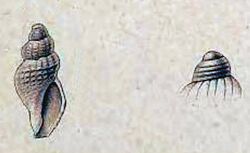Biology:Oenopota koreni
| Oenopota koreni | |
|---|---|

| |
| Original image of a shell and the protoconch of Oenopota koreni | |
| Scientific classification | |
| Domain: | Eukaryota |
| Kingdom: | Animalia |
| Phylum: | Mollusca |
| Class: | Gastropoda |
| Subclass: | Caenogastropoda |
| Order: | Neogastropoda |
| Superfamily: | Conoidea |
| Family: | Mangeliidae |
| Genus: | Oenopota |
| Species: | O. koreni
|
| Binomial name | |
| Oenopota koreni (Friele, 1886)
| |
| Synonyms[1] | |
|
Bela koreni Friele, 1886 (original combination) | |
Oenopota koreni is a species of sea snail, a marine gastropod mollusk in the family Mangeliidae.[1]
Description
The length of the shell is 5 mm, its diameter 2.2 mm.
(Original description) The cylindrical shell has a fusiform shape. It contains 4 whorls, rounded, somewhat tumid. The protoconch is obtuse; on the primary whorl there are 3 faint spiral striations visible. The suture s shallow. The aperture is not very open and measures about half the length of the shell The siphonal canal is straight, short and wide, and at the extremity truncately transected. The sculpture consists of nearly straight axial ribs (10 on the ultimate whorl) which are, on the upper part of the whorl, alone, distinctly visible, and of pretty faint, but somewhat close-set, spiral striations. The outer lip, which is somewhat broken, appears to bear a distinct trace of a sinus.[2]
Distribution
This species occurs in the North Sea off Norway
References
- ↑ 1.0 1.1 Oenopota koreni (Friele, 1886). Retrieved through: World Register of Marine Species on 10 August 2011.
- ↑ Friele H., 1877: Preliminary report on the Mollusca from the Norwegian North Atlantic Expedition in 1876; Nyt Magazin for Naturvidenskaberne 23: 1–10, 1 pl.
 This article incorporates text from this source, which is in the public domain.
This article incorporates text from this source, which is in the public domain.
External links
- Tucker, J.K. (2004). "Catalog of recent and fossil turrids (Mollusca: Gastropoda)". Zootaxa 682: 1–1295. http://www.mapress.com/zootaxa/2004f/z00682f.pdf.
Wikidata ☰ Q5232470 entry
 |

